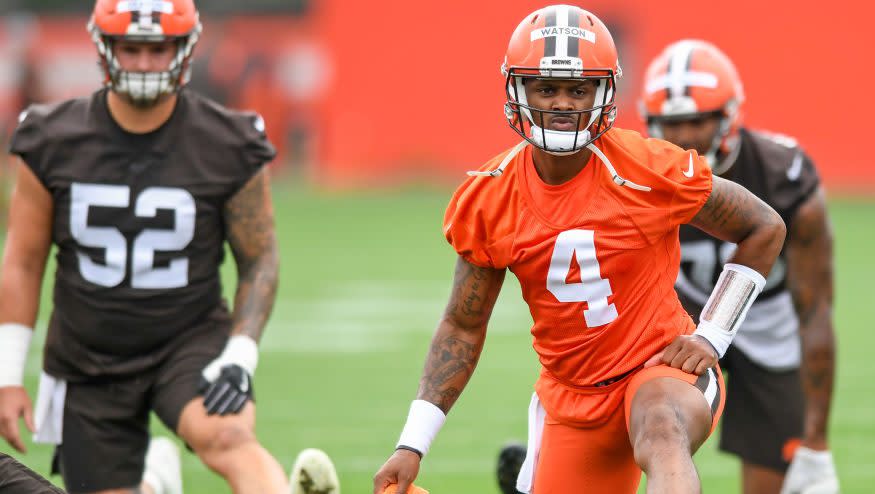
As the third day of the Deshaun Watson hearing begins, with no information regarding the evidence or the arguments making their way to the media, the process continues toward a decision from Judge Sue L. Robinson. Now or at any time before that happens, the two sides could reach a deal on an agreed punishment.
Efforts previously occurred. They failed, reportedly because the league wanted nothing less than a one-year suspension.
It can still happen. An idea for getting it done appears below.
While recently perusing Article 46 of the Collective Bargaining Agreement, I noticed Section 5. Here’s what it says: “Players who are placed by the Commissioner on the Exempt list prior to the determination of discipline and any appeal therefrom under the Personal Conduct Policy will be paid while on the Commissioner Exempt list and credited for the regular and postseason games missed against any suspension ultimately imposed. Notwithstanding any other provision in this Agreement, if such a suspension is ultimately imposed, the player must promptly return and shall have no further right to any salary for the games for which he was paid while on the Commissioner Exempt list that were credited to the suspension (i.e., for a number of games no greater than the length of the suspension).”
In English, this means that a player placed on paid leave who is eventually suspended gets credit for the games missed while on paid leave. He simply has to surrender the money he made while on paid leave.
Technically, Watson wasn’t on paid leave in 2021. The league never had to decide whether to invoke the Commissioner Exempt list, because he was on de facto paid leave; he didn’t want to play for the Texans and the Texans didn’t want him playing. He received $10 million from the Texans to not play.
Now for the idea. The NFL and the NFL Players Association, acting on Watson’s behalf, could agree that 2021 will be treated as a suspension, with Watson losing the $10 million he was paid. Also, he’ll miss eight games to start the 2022 season.
He missed all of 2021. That should count for something. Moreover, this approach would give the league a way to create the impression that it imposed significant punishment on Watson: 25 total games, without pay.
Collecting the $10 million he received in 2021 also would help counter the impression that the Browns structured a deal to minimize the financial consequences of a suspension in 2022, since his base salary is only $1.035 million. Instead, he’d lose a total of $10.46 million in salary. (He also could be required to surrender 8/18ths of his $9 million signing-bonus allocation for 2022; that’s another $4 million gone for good.)
Some would say this makes too much sense to ever happen. It definitely makes sense for the two sides to be trying to come up with ideas for an agreed solution that works for everyone.
Barring a deal, there’s nothing in the CBA that would prevent Judge Robinson from basing a decision on the notion that 2021 should be treated as a suspension after the fact, with Watson losing $10 million and getting credit for 17 games missed.
Although Watson’s absence in 2021 didn’t technically relate to the off-field issues, he surely would have been traded but for the allegations made against him. If he’s willing to give up the $10 million he made in 2021, why shouldn’t 2021 be treated as part of the final punishment?
Here’s a proposed deal to resolve the Deshaun Watson case originally appeared on Pro Football Talk
